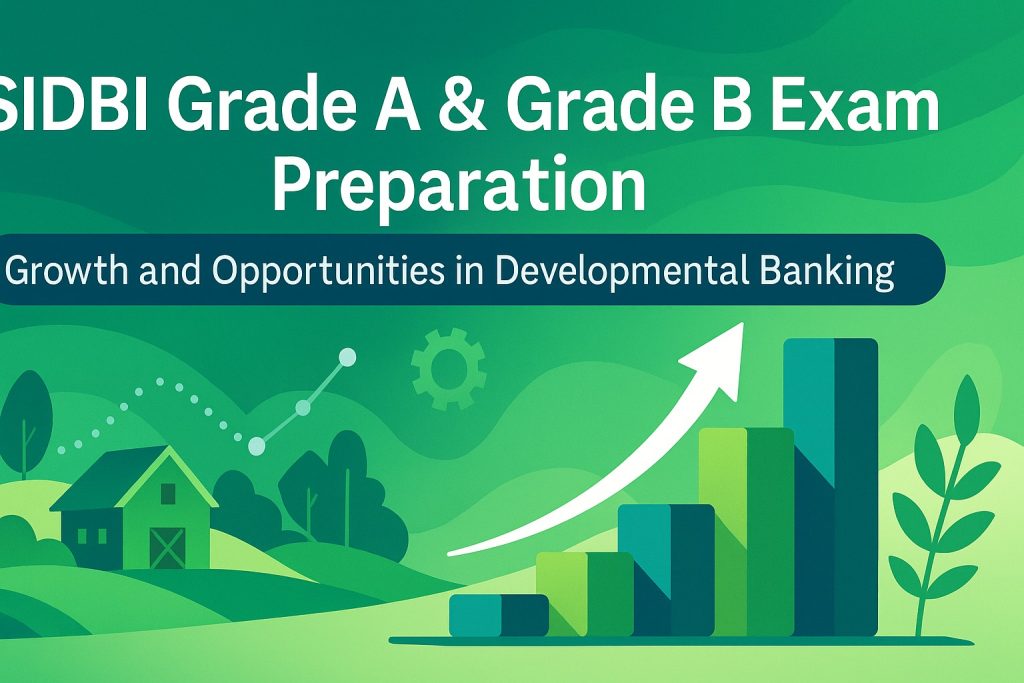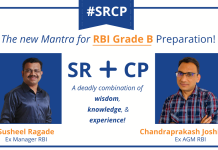For MBA students, bankers, and finance professionals, the SIDBI Grade A and Grade B exams offer a prestigious and unique career path. Unlike traditional banking roles, these positions emphasize developmental banking, focusing on policy-making, planning, and supporting the growth of small and medium enterprises (SMEs) in India. This makes them highly attractive for candidates who want to combine financial expertise with meaningful impact on the economy. So read on to know more about new career opportunities with the SIDBI Grade A & Grade B Exam. With the notification out, you should know all about the SIDBI Grade A & Grade B Exam.

Why SIDBI Grade A and Grade B Roles Are Unique
The Small Industries Development Bank of India (SIDBI) plays a critical role in promoting entrepreneurship and MSME growth. Grade A and Grade B positions in SIDBI focus on strategic development rather than routine branch banking. Officers are involved in planning financial programs, managing large-scale fund disbursements, and shaping policies for small and medium businesses.
For aspirants, this means exposure to high-level financial decision-making and a career path that directly contributes to economic development. These roles are ideal for MBA students and bankers seeking intellectually stimulating work and career advancement beyond day-to-day operations.
Attractive Salary Structure and Perks in SIDBI
One of the strongest motivators for candidates is the competitive salary package offered for SIDBI Grade A and Grade B officers. The pay is structured to reflect the responsibility of the roles, and it is enhanced by multiple allowances and perks.
- SIDBI Grade A Officers: The basic pay starts at approximately ₹44,500. With allowances, the gross monthly salary is around ₹1,00,000.
- SIDBI Grade B Officers: The basic pay is about ₹55,200, with allowances raising the gross salary to nearly ₹1,50,000 per month.
What makes these positions even more appealing is the expected wage revision. The upcoming pay hike is likely to increase salaries by ₹15,000–₹20,000 per month, making the compensation package even more attractive.
SIDBI Grade A vs Grade B Salary Comparison
If you want to know what the SIDBI Grade A and B Salary is like, we have provided a comparison that will make you understand this better The table below represents this comparison effectively
| Component | SIDBI Grade A Officer | SIDBI Grade B Officer |
| Basic Pay | ₹44,500 | ₹55,200 |
| House Rent Allowance (HRA) | ₹20,000–₹25,000 | ₹25,000–₹30,000 |
| Conveyance & Petrol | ₹6,000–₹8,000 | ₹8,000–₹10,000 |
| Telephone/Internet | ₹1,500–₹2,000 | ₹1,500–₹2,000 |
| Household/Furniture Allowance | ₹7,000–₹10,000 | ₹8,000–₹12,000 |
| Gross Monthly Salary | ₹1,00,000 | ₹1,50,000 |
Do take note that salaries are approximate and may vary based on your location and upcoming wage revisions. These benefits make SIDBI roles financially rewarding while providing stability and perks that significantly enhance lifestyle.
Comprehensive Allowances That Improve Quality of Life
Apart from the basic pay, SIDBI officers enjoy a range of allowances that reduce living costs and improve work-life balance. HRA ensures comfortable housing in metro and tier-1 cities, while conveyance and petrol allowances cover daily travel expenses. Additional benefits like leave travel concession, furniture allowance, and household support further add to the package.
For Grade B officers, the higher allowances reflect their greater responsibilities and seniority, making the overall compensation package extremely competitive compared to other financial institutions.
How to Prepare for SIDBI Grade A and Grade B Exams
Cracking the SIDBI exams requires focused preparation, especially given the competition. Candidates must develop a strong understanding of policy-making, MSME development, and general awareness. Reliable study materials are essential to save time and ensure accuracy.
Resources like BeePedia are recommended for general awareness and MSME-related content. These concise and targeted materials are particularly useful for aspirants balancing preparation with full-time work.
Time-Sensitive Learning for Working Professionals
Many SIDBI aspirants are already working in banks or financial services. The preparation strategy must therefore be time-efficient and focused. Structured courses designed to cover only the most relevant topics can help working professionals make the best use of limited study hours.
Expert-led classes also provide guidance on exam patterns, descriptive answers, and interview preparation, all of which are critical for securing a high score.
Support System for Clearing Doubts
One important aspect of successful preparation is having a responsive support system. Access to mentors and faculty who can clarify doubts and explain complex topics keeps preparation on track and prevents stagnation. For an exam as competitive as SIDBI’s, consistent progress is key to staying ahead.
Career Advancement Beyond Routine Banking
A career with SIDBI represents more than just a high-paying job. Grade A and Grade B officers move into the strategic side of banking, focusing on development finance and supporting India’s small industries. This offers a refreshing change from routine branch activities and provides long-term career growth in an evolving sector.
For MBA graduates and banking professionals aiming to make a larger impact, SIDBI offers the opportunity to combine financial expertise with nation-building.
Dynamic and Evolving Career Path
SIDBI, like the broader financial sector, is dynamic. With regular wage revisions, evolving policies, and growing responsibilities, these roles are far from static. Officers are constantly learning and adapting to new challenges, ensuring a career filled with growth and opportunities.
This continuous evolution also means that aspirants must stay updated on sector developments during preparation to perform well in both written exams and interviews.
SIDBI Grade A & B Exam Pattern and Syllabus
To prepare effectively, aspirants must understand the exam structure. The SIDBI Grade A and Grade B exams are conducted in two main stages – a preliminary objective test and a descriptive mains exam, followed by an interview. The preliminary stage evaluates reasoning, quantitative aptitude, English, and general awareness with a special focus on banking and MSME-related topics. The descriptive mains exam tests candidates on essay and letter writing, assessing both knowledge and communication skills.
The syllabus covers a mix of conceptual and practical areas such as monetary policy, MSME development, government schemes, RBI and SIDBI’s roles, along with current affairs in the financial sector.
Quantitative aptitude, reasoning ability, and general English form the base, while descriptive papers focus on economic analysis and drafting ability. A clear understanding of this structure helps candidates allocate study time strategically and balance objective and descriptive preparation.
Key Points for SIDBI Aspirants
To maximize your preparation and career opportunities with SIDBI:
- Use authentic and concise study materials for MSME and general awareness.
- Understand developmental banking and policy-making concepts in depth.
- Balance preparation with work through structured, expert-led courses.
- Leverage support systems to clarify doubts and maintain steady progress.
- Stay updated on salary revisions, policies, and sector changes.
The video above gives you everything you need to know about the SIDBI Grade A and Grade B Exam, so do check it out.
Summing Up
Preparing for SIDBI Grade A and Grade B exams is about more than passing a competitive test. It’s about stepping into a role that shapes policies, supports small industries, and contributes to economic growth. With high salaries, generous allowances, and a unique focus on developmental banking, SIDBI offers a career path that combines reward and responsibility.
A focused preparation plan, the right resources, and consistent effort can set you on the path to success. For MBA students, bankers, and finance professionals, these exams open doors to a meaningful and prestigious career in one of India’s most important financial institutions.
ixamBee specializes in providing expert guidance and resources for banking exams 2025, ensuring that you are well-prepared for the Upcoming Bank Exams like RBI Grade B, NABARD Grade B, IBPS SO, and more. Our courses align with the bank exam calendar 2024, covering all the essential topics. With a focus on the upcoming bank jobs, our Previous Year Papers, BeePedia, SSC CGL, SSC CHSL, SSC MTS and other Mock Tests are designed to help you excel in upcoming banking exams.
Also Read:
IB ACIO 2025: Important Topics for Current Affairs IB ACIO
UPSC Job Without CSE ? All About EPFO 2025 EO/AO & APFC
RBI Grade B & Grade A Preparation: How to Use the RBI Website Effectively















